Managing Oneself expanded work plan version
(A Harvard Business Review Classics)
About Peter Drucker !!! Everybody needs a coach and he's as good as it gets.
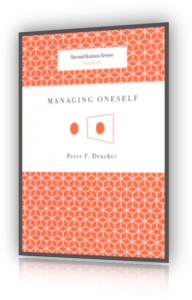
Amazon.com link: Managing Oneself (Harvard Business Review Classics) 
This page is a step beyond early career work—which should be explored first.
@ July 2, 2011: I'm still working on this page. I need to add a basic career work map (based on the contents of this page) further down the page plus there are a few sections that need additional thoughts. These sections may be marked with a @ symbol.
Bottom line: You are the CEO of your life. It is up to you to develop yourself. It is up to you to navigate your way through time—2020, 2040 … a world moving toward unimagined futures. This page provides the blueprint for working on the work life aspect of that navigation.
Those who want to live a fulfilling life—who want to feel as if there is some purpose in their being on this earth—will have to learn to manage themselves.
They will have to accept the fact that it is their own responsibility to find meaningful work that builds on their strengths and values.
"The World Is Full Of Options" by Peter Drucker
(be sure to explore the two preceding links ASAP)
Successful careers are not planned. They develop when people are prepared for opportunities because they know their strengths, their method of work, and their values. Knowing where one belongs can transform an ordinary person—hardworking and competent but otherwise mediocre—into an outstanding performer.
The conclusion bears repeating: Do not try to change yourself—you are unlikely to succeed. But work hard to improve the way you perform. And try not to take on work you cannot perform or will only perform poorly.—Peter Drucker (calendarize this)
Before exploring the remainder of the page you might want to set up a harvesting and implementation system—something you can calendarize. It would be a good idea to have some kind of structured note-taking system for harvesting ideas on this and its linked pages. I'm a Mac user. I personally use OmniOutliner Pro, MindNode Pro (there is a free non-pro version), Scrivener, and DEVONthink Pro. Unless you need a heavy article archiving solution, Scrivener should do the job.
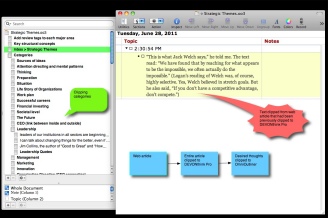 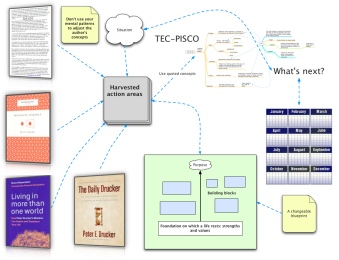
Why do we need to manage ourselves—won't an organization do it for us ?
Life throws curve balls—things change. (See Lemonade on YouTube)
Things won't turn out the way you expect. Our expectations come from our mental patterns and rarely from our awareness of the future that has already happened.
"EVERY FEW HUNDRED YEARS in Western history there occurs a sharp transformation. We cross what in an earlier book, I called a "divide." See The New Realities—1989.
Within a few short decades, society rearranges itself—its worldview; its basic values; its social and political structure; its arts; its key institutions. Fifty years later, there is a new world. And the people born then cannot even imagine the world in which their grandparents lived and into which their own parents were born.
We are currently living through just such a transformation. It is creating the Post-Capitalist Society."
"Not only do we have the challenge of outliving our organizations, but we are also living longer than our ancestors did. We are fortunate that because we have not done the hard physical labor of manual workers, we are not physically worn out during the second half of life. We may, however, be mentally and spiritually drained, bored, or burned out by midlife. Drucker wrote that the fabled midlife crisis of executives was mostly boredom. Although he wrote of people becoming so bored and jaded that they had, in essence, retired on the job, that is a less common phenomenon today. Some people still may "retire on the job," but there are fewer occasions for that to happen in today's shrinking workforce. Many people (especially those over age fifty) are being eased out of jobs long before this kind of crisis sets in. Others are increasingly vulnerable to job elimination through outsourcing or offshoring. These factors make planning for a second career even more imperative.
These are all reasons, Drucker advised, that we should think of making changes in what we do and how we do it. Because we are able to approach these decisions from a more mature, experienced standpoint than we could earlier in life, we may seek to find and create more meaning for ourselves and others" Living in more than one world : how Peter Drucker's wisdom can inspire your life by Bruce Rosenstein
Be prepared!!! This page is designed to help with that preparation.
I suggest identifying your action areas on this page and then calendarize them.
The topics introduced on this page and its linked pages are like stars in a constellation. The constellation is managing oneself—over a life time. Everybody's constellation is different and should be different. The challenge is to make sure that one's constellationS work both in the outside world and for the individual. This takes time investmentS now and in the futureS. The work maps you create will help visualize your constellationS. These maps should be tested for their adequacy—are they adequate for the challenges ahead. The daily news can provide a testing methodology. @ What can be learned from the Toyota sticking gas pedals situation?
Its probably best to read through the page before exploring the linked pages.
The portion of the following that applies to “Managing Onself” (the book) provides a foundational survey beyond job thinking—it is possible to add more layers depending on one's developmental desires. Some of those additional layers are introduced further down the page.
This page is different from a specialized news or topic article. It is a "view" of our conceptual social "landscape" and our conceptual "time-scape." It is meant for exploring and noting desirable action areas.
It is crucial to remember that its not possible to work on things we don't know about or aren't on our active radar! We need an action management system—some links and illustrations are provided further down the page. This page intends to provide a blueprint for designing a foundational knowledge worker action management system.
By examining organizational crisis examples it is easy to conclude that working from a brainstormed to do list is inadequate to the challenges ahead. David Allen's Getting Things Done and similar approaches offer some valuable tools, but by themselves they are misleading—too much of the wrong things and almost none of the right things. They view the world as existing in one simple time dimension—yesterday—and the user's flow of events. Evidence of this inadequacy can be seen in the daily news and the links on this page!!! (As a former corporate restructuring executive I've met almost nobody who is really prepared for the unfolding world in which we are embedded—this will have impact on all of us. We can't depend on others to look after us.)
In a developing world, a developing society, a developing economy just doing routine work is so yesterday! Waiting until there is an obvious need is essentially waiting to fail. When there is an obvious need there is no time to manage oneself.
Try to avoid being left behind in the shift to a society dominated by knowledge and the dynamics of change that is inherent in knowledge as THE resource of society. Knowledge is always embedded in a person … not in some computer system or book. Some books are useful as a work "road map" or "attention re-directing tool."
Exploring the origins of our desired standard of living (the "things" we consume) points the way to "seeing" knowledgeS. In other words what knowledge is required to produce and distribute what we desire and can afford? What knowledgeS are required to form a new "needed" knowledge? What knowledgeS existed before 1950? What knowledges underlie an iPod+iTunes, iPad, or iPhone4?
Knowledges by themselves are sterile. They become productive only if welded together into a single, unified knowledge. To make this possible is the task of organization, the reason for its existence, its function.
 
 
Knowledge work and knowledge worker presence is implied in the then and now images above (farms and cities). These implications exist not only in the content of the images, but in the image creation and delivery. It should be noted that the percentage of the population necessarily engaged in growing the food we consume has dramatically shrunk. What will the images of 2030 reveal? See Peter Drucker on the future of the city (Find "From Analysis to Perception—the New World View" in my outline of Peter Drucker's work).
See Managing Knowledge Means Managing Oneself on the Leader to Leader Institute site
Contents of Managing Oneself (the book)
- History's great achievers
- Learning to manage oneself
- What Are My Strengths? (calendarize this) bobembry's caution: strengths can't be discovered by taking a test or reading a book. What sports coach would select potential players based a test? "Just show me the performance"—and even that is suspect.
- Feedback analysis
- Action implications
- How Do I Perform? (calendarize this)
- Am I a reader or a listener?
- How do I learn?
- Alone or with others—in what relationship?
- Decision maker or advisor
- What kind of work environment?
- Conclusion
- What Are My Values? (calendarize this)
- Where Do I Belong? (calendarize this)
- What Should I Contribute? (calendarize this)
- Responsibility For Relationships (calendarize this)
- Accepting others as individuals
- Responsibility for communications
- The Second Half Of Your Life (calendarize this) (Josh Abrams story and self-development approach)
- The boredom challenge
- Three ways to develop a second career
- Those who manage themselves are the leaders and models for the rest of society
- Starting early—a prerequisite (calendarize this)
- Serious setbacks—another motivator
- Summary—A revolution in human affairs
- About The Author
Don't memorize … calendarize (identify work areas, next actions, and follow-ups in writing—mind maps may be helpful)!!! See harvesting and implementing
Quotes from Managing Oneself (the book)
History's great achievers
That, in large measure, is what makes them great achievers. But they are rare exceptions, so unusual both in their talents and their accomplishments as to be considered outside the boundaries of ordinary human existence.
Learning to manage oneself
Now, most of us, even those of us with modest endowments, will have to learn to manage ourselves. We will have to learn to develop ourselves. Will have to place ourselves where we can make the greatest contribution. And we will have to stay mentally alert and engaged during a 50-year working life, which means knowing how and when to change the work we do.
How Do I Perform? (Conclusion)
The conclusion bears repeating: Do not try to change yourself—you are unlikely to succeed. But work hard to improve the way you perform. And try not to take on work you cannot perform or will only perform poorly.
Where do I belong
Equally important, knowing the answer to these questions enables a person to say to an opportunity, an offer, or an assignment, "Yes, I will do that. But this is the way I should be doing it. This is the way it should be structured. This is the way the relationships should be. These are the kind of results you should expect from me, and in this time frame, because this is who I am."
Successful careers are not planned
They develop when people are prepared for opportunities because they know their strengths, their method of work, and their values. Knowing where one belongs can transform an ordinary person—hardworking and competent but otherwise mediocre—into an outstanding performer.
Summary—A revolution in human affairs
The challenges of managing oneself may seem obvious, if not elementary. And the answers may seem self-evident to the point of appearing naïve. But managing oneself requires new and unprecedented things from the individual, and especially from the knowledge worker. In effect, managing oneself demands that each knowledge worker think and behave like a chief executive officer. Further, the shift from manual workers who do as they are told to knowledge workers who have to manage themselves profoundly challenges social structure. Every existing society, even the most individualistic one, takes two things for granted, if only subconsciously: that organizations outlive workers, and that most people stay put.
But today the opposite is true. Knowledge workers outlive organizations, and they are mobile. The need to manage oneself is therefore creating a revolution in human affairs.
"Part X: New Demands on the Individual" in Management, Revised Edition also contains a chapter on Managing Oneself along with several other important topics. (@ I need to add a list here). Also see Living in more than one world.
In Peter Drucker's My Life as a Knowledge Worker he reveals important lessons he learned through out his life. Be sure your brain has gone down this mental road and thought about how this plays out in a changing world. Please consider calendarizing these seven critical lessons. These lessons can also be found in chapter 47, "Revitalizing Oneself—Seven Personal Experiences" of Management, Revised Edition.
Knowledge workers, managers, or individual professionals who are expected by virtue of their position or their knowledge to make decisions in the normal course of their work that have significant impact on the performance and results of the whole may surely benefit from investing time calendarizing Peter Drucker's Effective Executive.
The Effective Executive in Action provides a work book, but its not a substitute. There is a some overlap between Managing Oneself and The Effective Executive.
The Time Management chapter in The Effective Executive is a helpful action guide and the key to REAL development.
From Peter Drucker's Effective Executive
Enormous resources are brought together in the modern large business, in the modern large government agency, in the modern large hospital, or in the university; yet:
- far too much of the result is mediocrity,
- far too much is splintering of efforts,
- far too much is devoted to yesterday or to avoiding decision and action.
Organizations as well as executives need to work systematically on effectiveness and need to acquire the habit of effectiveness.
- They need to learn to feed their opportunities and to starve their problems.
- They need to work on making strength productive.
- They need to concentrate and to set priorities instead of trying to do a little bit of everything.
Capability planning: Given all of the above, carefully and realistically identifying one's ongoing knowledge specialty and the skills needed to do what one aims to do is an essential career and life design work module. This should begin well before college graduation and continue through one's life. It might be extremely helpful to test one's knowledge and skill conclusions against "help wanted" sites (local and national). These types of capabilities control the doors that we are able to enter. A very capable brain surgeon is not qualified to enter the rocket science "door." Both rocket scientist and brain surgeon still need to manage themselves. Having a valuable knowledge specialty is not enough by itself. Evidence of this need is in the news everyday!!
Also see the preface to The Effective Executive.
The following is some additional guidance from Peter Drucker.
Acquiring new knowledge: Throughout history, crafts people who had learned a trade had acquired everything they would ever need to know during their lifetime after five or six years of apprenticeship, at age seventeen or eighteen. In the post-capitalist society, it is safe to assume that anyone with any knowledge will have to acquire new knowledge every four or five years, or else become obsolete. See Drucker's thoughts on continuing education. A view of the education system.
Aiming high: The first rule (of managing knowledge) may well be that knowledge has to aim high to produce results. The steps may be small and incremental but the goal must be ambitious. Knowledge is productive only if it is applied to make a difference.
The Hungarian-American Nobel prize-winner Albert Szent-Györgyi (1893-1990) revolutionized physiology. When asked to explain his achievements, he gave the credit to his teacher, an otherwise obscure professor at a provincial Hungarian university. "When I got my doctorate," Szent-Györgyi said, "I proposed to study flatulence—nothing was known about it and nothing is known about it still." "Very interesting," the professor said, "but no one has ever died of flatulence. If you have results (and it's a big 'if'), you'd better have them where they'll make a difference." "And so," Szent-Györgyi went on, "I took up the study of basic bodily chemistry and discovered the enzymes."
Every single one of Szent-Györgyi's research projects was a small step. But from the beginning he aimed high: discovery of the basic chemistry of the human body. Similarly, in Japanese Kaizen, every single step is a small one—a minor change here, a minor improvement there. But the aim is to produce by means of step-by-step improvements a radically different product, process, or service a few years later. The aim is to make a difference.
To make knowledge productive further requires that it be clearly focused. It has to be highly concentrated. Whether done by an individual or by a team, the knowledge effort requires purpose and organization. It is not "flash of genius." It is hard work.
To make knowledge productive also requires the systematic exploitation of opportunities for change what in an earlier book I called the "Seven Windows of Innovation." (See Purposeful Innovation & the 7 Sources of Innovative Opportunity) These opportunities have to be matched with the competences and strengths of the knowledge worker and the knowledge team.
To make knowledge productive finally requires managing time. High knowledge productivity—whether in improvement, in exploitation, or in innovation—comes at the end of a long gestation period. Yet productivity of knowledge also requires a constant stream of short-term results. It thus requires the most difficult of all management achievements: balancing the long term with the short term.
Our experience in making knowledge productive has so far been gained mainly in the economy and technology. But the same rules pertain to making knowledge productive in society, in the polity, and with respect to knowledge itself. So far, little work has been done to apply knowledge to these areas. But we need productivity of knowledge even more in these areas than we need it in the economy, in technology, or in medicine.
Competitive arenas (from Managing in the Next Society by Peter Drucker): In the new mental geography created by the railroad, humanity mastered distance. In the mental geography of e-commerce, distance has been eliminated. There is only one economy and only one market.
One consequence of this is that every business must become globally competitive, even if it manufactures or sells only within a local or regional market. The competition is not local anymore—in fact, it knows no boundaries. Every company has to become transnational in the way it is run. Yet the traditional multinational may well become obsolete. It manufactures and distributes in a number of distinct geographies, in which it is a local company. But in e-commerce there are neither local companies nor distinct geographies. Where to manufacture, where to sell, and how to sell will remain important business decisions. But in another twenty years they may no longer determine what a company does, how it does it, and where it does it.
At the same time, it is not yet clear what kinds of goods and services will be bought and sold through e-commerce and what kinds will turn out to be unsuitable for it. This has been true whenever a new distribution channel has arisen. Why, for instance, did the railroad change both the mental and the economic geography of the West, whereas the steamboat—with its equal impact on world trade and passenger traffic—did neither? Why was there no "steamboat boom"?
Equally unclear has been the impact of more recent changes in distribution channels—in the shift, for instance, from the local grocery store to the supermarket, from the individual supermarket to the supermarket chain, and from the supermarket chain to Wal-Mart and other discount chains. It is already clear that the shift to e-commerce will be just as eclectic and unexpected.
Here are a few examples. Twenty-five years ago it was generally believed that within a few decades the printed word would be dispatched electronically to individual subscribers' computer screens. Subscribers would then either read text on their computer screen or download it and print it out. This was the assumption that underlay the CDROM. Thus any number of newspapers and magazines, by no means only in the United States, established themselves on-line; few, so far, have become gold mines. But anyone who twenty years ago predicted the business of Amazon.com and barnesandnoble.com—that is, that books would be sold on the Internet but delivered in their heavy, printed form—would have been laughed off the podium. Yet Amazon.com and barnesandnoble.com are in exactly that business, and they are in it worldwide. The first order for the U.S. edition of my most recent book, Management Challenges for the 21st Century (1999), came to Amazon.com, and it came from Argentina.
Mistakes (Rick Wartzman article in Businessweek):
"Nobody learns except by making mistakes," Drucker wrote in his 1954 landmark book, The Practice of Management. "The better a man is, the more mistakes he will make—for the more new things he will try. I would never promote a man into a top-level job who has not made mistakes, and big ones at that. Otherwise, he is sure to be mediocre. Worse still, not having made mistakes he will not have learned how to spot them early and how to correct them."
Drucker's tolerance for mistakes shouldn't be confused with him cottoning to incompetence. There are plenty of occasions, he believed, when employees should be let go. "Management owes this to the enterprise," Drucker said. "It owes it to the spirit of the management group, especially to those who perform well. It owes it to the man himself, for he is likely to be the major victim of his own inadequacy."
But he cautioned against overreaching: "That a man who consistently renders poor or mediocre performance should be removed from his job also does not mean that a company should ruthlessly fire people right and left." And he made clear that those in charge can't just turn around and blame those who work for them. "Whenever a man's failure can be traced to management's mistakes," Drucker declared, "he has to be kept on the payroll."
BATTING AVERAGE
Among management's most common errors is putting a good person into the wrong job. After all, Drucker noted, "there is no such thing as an infallible judge of people, at least not on this side of the Pearly Gates." Whenever such a slip-up is made, Drucker counseled, it's incumbent on the boss to say: "I have no business blaming that person, no business invoking the 'Peter Principle,' no business complaining. I have made a mistake."
In the end, Drucker defined success not as being right every time. Rather, he wrote in his 1973 classic Management: Tasks, Responsibilities, Practices, performance must be evaluated on terms more akin to a batting average. (Slugging percentage might even be a more apt way to look at it: Sometimes you hit a single or a double, and occasionally a home run. But other times, you strike out. Maybe even with the bases loaded.)
In Drucker's view, not always getting a hit is not only acceptable; it's part of what it takes to be an organization of excellence. "A management which does not define performance as a batting average is a management that mistakes conformity for achievement, and absence of weaknesses for strengths," Drucker asserted.
DIFFERENT PERFORMANCES
A batting-average mentality, he added, allows for companies to accommodate different kinds of talent. "One man will consistently do well, rarely falling far below a respectable standard, but also rarely excel through brilliance or virtuosity," Drucker wrote. "Another man will perform only adequately under normal circumstances but will rise to the demands of a crisis or a major challenge and then perform like a true 'star.' Both are 'performers.' Both need to be recognized. But their performances will look quite different.
"The one man to distrust, however, is the one who never makes a mistake," Drucker continued, "never commits a blunder, never fails in what he tries to do. He is either a phony, or he stays with the safe, the tried, and the trivial."
Drucker not only penned these words; he lived them. By the 1950s, Drucker had concluded there was only one way to manage people correctly: by assuming that all of them will be responsible and self-directed as long as they find their work fulfilling. In 1960 a competing theory was articulated, which held that managers treat each and every employee as if they are inherently self-centered, lazy, and resistant to change.
But then along came psychologist Abraham Maslow, who in 1962 maintained that, either way, a single approach is silly. Drucker was quickly persuaded. "Maslow's evidence is overwhelming," he wrote, that "different people have to be managed differently."
The bottom line for Drucker was that he and others who'd shared his one-size-fits-all view of human motivation "were dead wrong." If only more people had the courage to say that—and then learn from it—a lot more things would go right.
See outline of Drucker's work and The Daily Drucker for identifying other areas of ambition and work. My implementation process blueprint may trigger some ideas that will assist in designing your information tool kit. See using conceptual resources and conceptual resource list and worksheet plus links at the bottom of the page for additional assistance.
Planning for finding work: Investigate what is most helpful in networking, resume content and format, plus interview performance then integrate the heavy duty stuff into your current performance planning and execution while remembering "this is who I am" and capability planning.
These heavy duty concepts cover the things you want to be able to say about yourself and back up with evidence. The evidence creation is a major focus for your performance planning. Part of finding a new job or new work may also include having the "credentials" that employers seek. This requires some research and maybe some negotiation tactics—employer's requirement lists often include everything plus the kitchen sink.
CareerBuilder and Hot Jobs also have advice pages on networking, resumes, and interviewing. Plenty of other resources are available at Amazon.com
@ Some people will want to create and maintain a systematic opportunity research system that is consistent with "where do I belong," "this is who I am" and successful careers aren't planned—mentioned above. It is probably wise to follow Peter Drucker's advice on people decisions—fitting the assignment, people new to a organization should take on known work, and asking what the new job requires to be a success etc.
@ Something about personal branding, performance reviews along with the confusion over the distinction between knowledge and skills needs to be added.
Peter Drucker said it best, "Branding, by its very nature is not optional. If you do not position yourself in people's minds, they will do it for you."
The performance reviews which most of us a familiar are the creature of tactical, short-term HR people and not someone with an informed world view. In a way they are at odds with a lot of the ideas here. "Its people's abilities that matter, not their disabilities." Something from Drucker's people decisions. Also see experience number four in Drucker's My life as a Knowledge Worker.
In Peter Drucker's Post-Capitalist Society he writes about the shift to the knowledge society—he didn't say skills society.
Price of success: From Managing in the Next Society
The upward mobility of the knowledge society, however, comes at a high price: the psychological pressures and emotional traumas of the rat race. There can be winners only if there are losers. This was not true of earlier societies. The son of the landless labourer who became a landless labourer himself was not a failure. In the knowledge society, however, he is not only a personal failure but a failure of society as well.
Japanese youngsters suffer sleep deprivation because they spend their evenings at a crammer to help them pass their exams. Otherwise they will not get into the prestige university of their choice, and thus into a good job. These pressures create hostility to learning. They also threaten to undermine Japan's prized economic equality and turn the country into a plutocracy, because only well-off parents can afford the prohibitive cost of preparing their youngsters for university. Other countries, such as America, Britain and France, are also allowing their schools to become viciously competitive. That this has happened over such a short time—no more than 30 or 40 years—indicates how much the fear of failure has already permeated the knowledge society.
Given this competitive struggle, a growing number of highly successful knowledge workers of both sexes—business managers, university teachers, museum directors, doctors—"plateau" in their 40s. They know they have achieved all they will achieve. If their work is all they have, they are in trouble. Knowledge workers therefore need to develop, preferably while they are still young, a non-competitive life and community of their own, and some serious outside interest—be it working as a volunteer in the community, playing in a local orchestra or taking an active part in a small town's local government. This outside interest will give them the opportunity for personal contribution and achievement. See Living in more than one world and wisely choosing your non-profit affiliations.
"@Half Truths" (work in process)
@ Value of Experience (in an unfolding world)
@ You can be what ever you want to be
Additional perspective:
Dr. Phil's constant question: How's it (whatever your doing) working for you? … Make sure you're looking at the road ahead not looking back.
Action management
The foundation for action management is discussed in chapter 2 of the Effective Executive and The Effective Executive in Action.
To keep track of everything in one's work life a work map would probably be useful. This is explored in greater depth on my main career evolution page. The mind map below is an example of business plan mind map. It is presented not for its content but its form. The initial content of a basic career work map could be derived from this page. The purpose of the map is to have jumping off points for action planning. Each end node could become the topic of a dedicated mind map.
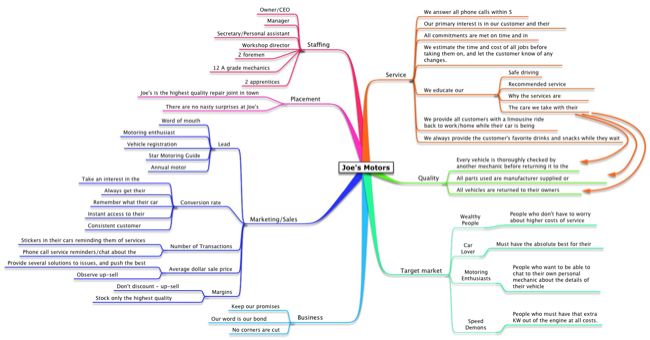
Also a structured note-taking system for recording and reviewing important topics is surely important.
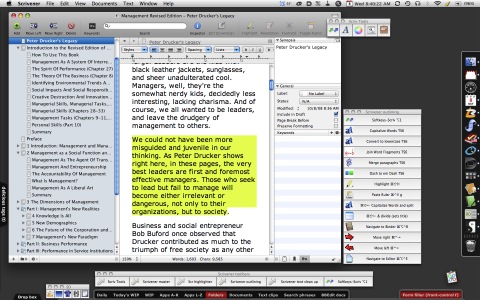
Courage rather than analysis dictates the truly important rules for identifying priorities:
-
Pick the future as against the past;
-
Focus on opportunity rather than on problems;
-
Choose your own direction—rather than climb on the bandwagon; and
-
Aim high, aim for something that will make a difference, rather than for something that is "safe" and easy to do.
Chapter 5 of The Effective Executive in Action has more info on First Things First.
When you are the chief executive, you're the prisoner of your organization. The moment you're in the office, everybody comes to you and wants something, and it is useless to lock the door. They'll break in. So, you have to get outside the office. But still, that isn't traveling. That's being at home or having a secret office elsewhere. When you're alone, in your secret office, ask the question, "What needs to be done?" Develop your priorities and don't have more than two. I don't know anybody who can do three things at the same time and do them well. Do one task at a time or two tasks at a time. That's it. OK, two works better for most. Most people need the change of pace. But, when you are finished with two jobs or reach the point where it's futile, make the list again. Don't go back to priority three. At that point, it's obsolete.
The Network Society
The developed countries are moving fast toward a Network Society.
For well over a hundred years, all developed countries were moving steadily toward an employee society of organizations. Now the developed countries, with the United States in the lead, are moving fast toward a Network Society in respect to the relationship between organizations and individuals who work for them, and in respect to the relationships between different organizations.
Most adults in the U.S. labor force do work for an organization.
But increasingly they are not employees of that organization.
They are contractors, part-timers, temporaries.
And relations between organizations are changing just as fast as the relations between organizations and the people who work for them.
The most visible example is "outsourcing," in which a company, a hospital, or a government agency turns over an entire activity to an independent firm that specializes in that kind of work.
Even more important may be the trend toward alliances.
Individual professionals and executives will have to learn that they must take responsibility for placing themselves.
This means above all they must know their strengths and look upon themselves as "products" that have to be marketed.
And in marketing one does not begin with the question: "What do we want?"
One begins with the questions:
- What does the other party want?
- What are its values?
- What are its goals?
- What does it consider results?
Identifying the Future
Futurists always measure their batting average by counting how many things they have predicted that have come true. They never count how many important things come true that they did not predict. Everything a forecaster predicts may come to pass. Yet, he may not have seen the most meaningful of the emergent realities or, worse still, may not have paid attention to them. There is no way to avoid this irrelevancy in forecasting, for the important and distinctive are always the result of changes in values, perception, and goals, that is, in things that one can divine but not forecast.
But the most important work of the executive is to identify the changes that have already happened. The important challenge in society, economics, politics, is to exploit the changes that have already occurred and to use them as opportunities. The important thing is to identify the "future that has already happened"—and to develop a methodology for perceiving and analyzing these changes. A good deal of this methodology is incorporated in my 1985 book Innovation and Entrepreneurship, which shows how one systematically looks to the changes in society, in demographics, in meaning, in science and technology, as opportunities to make the future.
Reinvent Yourself
Knowledge people must take responsibility for their own development and placement.
In today's society and organizations, people work increasingly with knowledge, rather than with skill. Knowledge and skill differ in a fundamental characteristic—skills change very, very slowly. Knowledge, however, changes itself. It makes itself obsolete, and very rapidly. A knowledge worker becomes obsolescent if he or she does not go back to school every three or four years.
This not only means that the equipment of learning, of knowledge, of skill, of experience that one acquires early is not sufficient for our present life time and working time. People change over such a long time span. They become different persons with different needs, different abilities, different perspectives, and, therefore, with a need to "reinvent themselves." I quite intentionally use a stronger word than "revitalize." If you talk of fifty years of working life—and this, I think, is going to be increasingly the norm—you have to reinvent yourself. You have to make something different out of yourself, rather than just find anew supply of energy.
… This is true for all knowledge work. "Generalists"—and this is what the traditional business enterprise, including the Japanese companies, tried to develop—are of limited use in a knowledge economy. In fact, they are productive only if they themselves become specialists in managing knowledge and knowledge workers. This, however, also means that knowledge workers, no matter how much we talk about "loyalty," will increasingly and of necessity see their knowledge area—that is, their specialization rather than the employing organization—as what identifies and characterizes them. Their community will increasingly be people who share the same highly specialized knowledge, no matter where they work or for whom.
… snip, snip …
… There is as a consequence only one satisfactory definition of management, whether we talk of a business, a government agency, or a nonprofit organization: to make human resources productive. It will increasingly be the only way to gain competitive advantage. Of the traditional resources of the economist—land, labor, and capital—none anymore truly confers a competitive advantage. To be sure, not to be able to use these resources as well as anyone else is a tremendous competitive disadvantage. But every business has access to the same raw materials at the same price. Access to money is worldwide. And manual labor, the traditional third resource, has become a relatively unimportant factor in most enterprises. Even in traditional manufacturing industries, labor costs are no more than 12 or 13 percent of total costs, so that even a very substantial advantage in labor costs (say a 5 percent advantage) results in a negligible competitive advantage except in a very small and shrinking number of highly labor-intensive industries (e.g., knitting woolen sweaters). The only meaningful competitive advantage is the productivity of the knowledge worker. And that is very largely in the hands of the knowledge worker rather than in the hands of management. Knowledge workers will increasingly determine the shape of the successful employing organizations.
Managing Oneself—Amazon.com Product Description
We live in an age of unprecedented opportunity: with ambition, drive, and talent, you can rise to the top of your chosen profession regardless of where you started out.
But with opportunity comes responsibility. Companies today aren't managing their knowledge workers' careers. Instead, you must be your own chief executive officer. That means it's up to you to carve out your place in the world and know when to change course. And it's up to you to keep yourself engaged and productive during a career that may span some 50 years.
In Managing Oneself, Peter Drucker explains how to do it. The keys: Cultivate a deep understanding of yourself by identifying your most valuable strengths and most dangerous weaknesses. Articulate how you learn and work with others and what your most deeply held values are. Describe the type of work environment where you can make the greatest contribution.
Only when you operate with a combination of your strengths and self-knowledge can you achieve true and lasting excellence. Managing Oneself identifies the probing questions you need to ask to gain the insights essential for taking charge of your career.
Peter Drucker was a writer, teacher, and consultant. His thirty-four books have been published in more than seventy languages. He founded the Peter F. Drucker Foundation for Nonprofit Management, and counseled thirteen governments, public services institutions, and major corporations.
Amazon.com Download Description
This is an enhanced edition of the HBR article 99204, originally published in March/April 1999.
HBR OnPoint HBR OnPoint Articles save you time by enhancing an original Harvard Business Review article with an overview that draws out the main points and an annotated bibliography that points you to related resources. This enables you to scan, absorb, and share the management insights with others.
Throughout history, people had little need to manage their careers—they were born into their station in life or, in the recent past, they relied on their companies to chart their career paths. But times have drastically changed.
Today, we must all learn to manage ourselves. What does that mean? According to Peter Drucker, it means we have to learn to develop ourselves. We have to place ourselves where we can make the greatest contribution to our organizations and communities. And we have to stay mentally alert and engaged during a 50-year working life, which means knowing how and when to change the work that we do.
It may seem obvious that people achieve results by doing what they are good at and by working in ways that fit their abilities. But, Drucker says, very few people actually know—let alone take advantage of—their unique strengths.
He challenges each of us to ask ourselves fundamental questions: What are my strengths? How do I perform? What are my values? Where do I belong? What should my contribution be? Don't try to change yourself, cautions Drucker. Instead, concentrate on improving the skills you have and accepting assignments that are tailored to your individual way of working. If you do that, you can transform yourself from an ordinary worker into an outstanding performer.
Successful careers today are not planned out in advance. They develop when people are prepared for opportunities because they have asked themselves those questions, and they have rigorously assessed their unique characteristics.
This article challenges readers to take responsibility for managing their futures, both in and out of the office. —This text refers to the Digital edition.
TLN keyword: tlnkwmanagingoneself
|


![]()